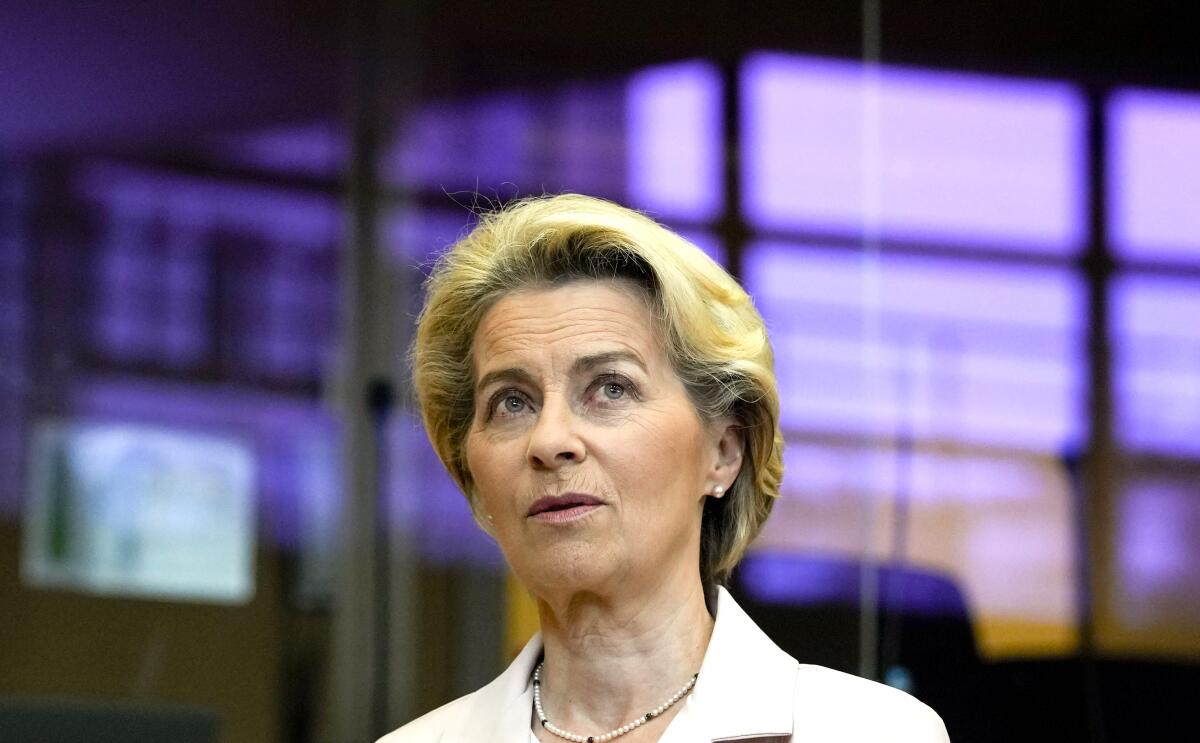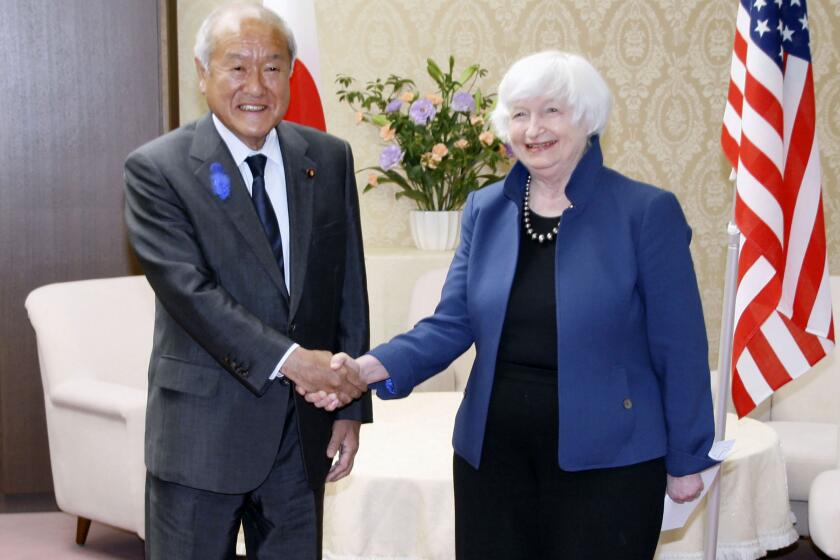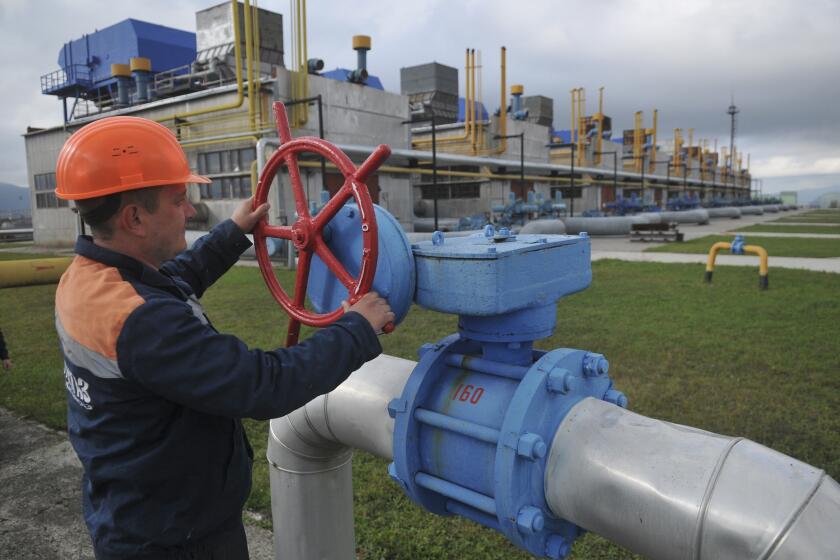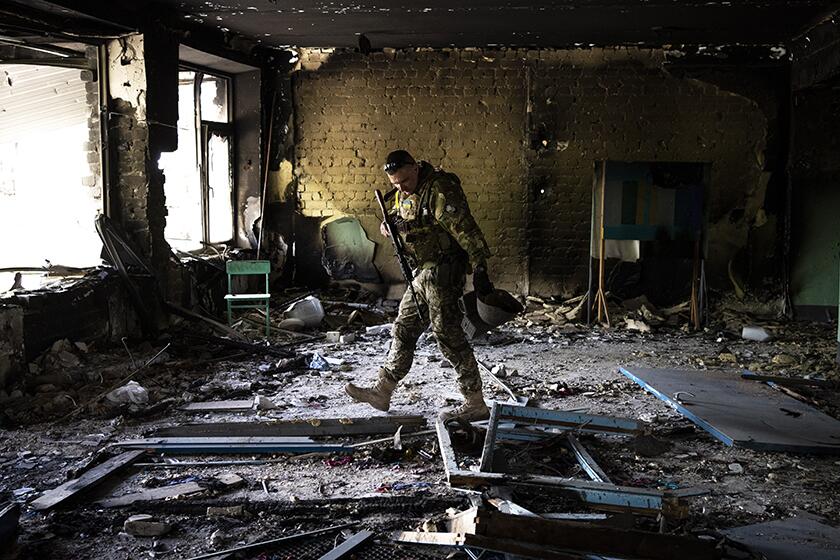EU proposes slashing gas use by 15% to gird for possible Russian cutoff

- Share via
BRUSSELS — The European Union’s head office proposed Wednesday that member states cut their gas use by 15% over coming months as the bloc braces for a possible full Russian cutoff of natural gas supplies that could add a big chill to the coming winter.
Although the initial cuts would be voluntary, the European Commission also asked for the power to impose mandatory reductions across the bloc in the event of an EU-wide emergency caused by what commission President Ursula von der Leyen saw as a deliberate attempt by President Vladimir Putin to weaponize gas exports.
“Russia is blackmailing us. Russia is using energy as a weapon. And therefore, in any event, whether it’s a partial major cutoff of Russian gas or total cutoff of Russian gas, Europe needs to be ready,” Von der Leyen said.
EU member states will discuss the measures at an emergency meeting of energy ministers Tuesday. For them to be approved, national capitals would have to consider yielding their powers over energy policy to Brussels.
“We have to be proactive. We have to prepare for a potential full disruption of Russian gas. And this is a likely scenario. That’s what we’ve seen in the past,” Von der Leyen said, adding that Kremlin-controlled Gazprom showed scant interest in market forces and instead played a political game to choke off the EU.
Saving 15% on gas use between August and next March will not come that easy. The European Commission signaled that its proposed target would require EU countries as a whole to triple the rationing achieved to date since the Russian invasion of Ukraine started Feb. 24.
Leaders of the Group of 7 industrial nations have tentatively agreed to back a cap on the price of Russian oil, the main source of Moscow’s revenue.
“EU-level savings so far have been equal to 5%,” EU Energy Commissioner Kadri Simson said. “This is clearly not enough.”
Wednesday’s proposal comes at a time when a blog post from the International Monetary Fund has warned about the about the weaknesses of the 27-nation bloc.
“The partial shutoff of gas deliveries is already affecting European growth, and a full shutdown could be substantially more severe,” the IMFBlog warned. It added that gross domestic product in member nations such as Hungary, Slovakia and the Czech Republic could shrink by up to 6%.
Italy, a country already facing serious economic problems, “would also face significant impacts.”
U.S. and European officials are coordinating with natural gas suppliers around the globe to cushion the impact of any cutoff in Russian supply.
EU economic forecasts last week showed that Russia’s war in Ukraine is expected to wreak havoc on economic recovery for the foreseeable future, with lower annual growth and record inflation. The disruptions in Russian energy trade threaten to trigger a recession in the bloc just as it is recovering from a pandemic-induced slump.
Since Russia invaded Ukraine, the EU has approved bans on Russian coal and most oil to take effect later this year, but it did not include natural gas because the bloc depends on gas to power factories, generate electricity and heat homes. Now, Von der Leyen is convinced that Putin will cut off gas anyway to try to inflict economic and political chaos on Europe this winter.
“Putin is trying to push us around this winter, and this he will dramatically fail [at] if we stick together,” Von der Leyen said.
The aim of her plan is to ensure that essential industries and services like hospitals keep functioning, while others would have to cut back. That could include lowering heat in public buildings and enticing families to use less energy at home.
Breaking News
Get breaking news, investigations, analysis and more signature journalism from the Los Angeles Times in your inbox.
You may occasionally receive promotional content from the Los Angeles Times.
EU nations and the European Commission have gone on a buying spree to diversify natural gas sources away from Russia, but the effort is expected to fall far short of providing businesses and homes with enough energy in cold months.
Russia has cut off or reduced gas to some EU countries, and there are fears that the energy crisis will get worse if Moscow does not restart a key pipeline to Germany after scheduled maintenance ends Thursday.
The energy squeeze is also reviving decades-old political challenges for Europe. Although the EU has gained centralized authority over monetary, trade, antitrust and farm policies, national capitals have jealously guarded their powers over energy matters.
The European Commission has spent decades chipping away at this bastion of national sovereignty, using previous supply disruptions to secure gradual gains in EU clout. The five-month-old Russian invasion of Ukraine is now the starkest test of whether member countries are willing to cede more of their energy powers.
Russian troops continued their offensive into the Donbas region on Saturday, aiming to encircle the easternmost point of Ukrainian control.
During the COVID-19 pandemic, member states did join in common action to help develop and buy vaccines in massive quantities in an unprecedented show of common resolve in the health sector.
“This is a moment for Europe to build upon the decisive action and solidarity displayed during the pandemic to address the challenging moment it faces today,” the IMFBlog said.
More to Read
Sign up for Essential California
The most important California stories and recommendations in your inbox every morning.
You may occasionally receive promotional content from the Los Angeles Times.













